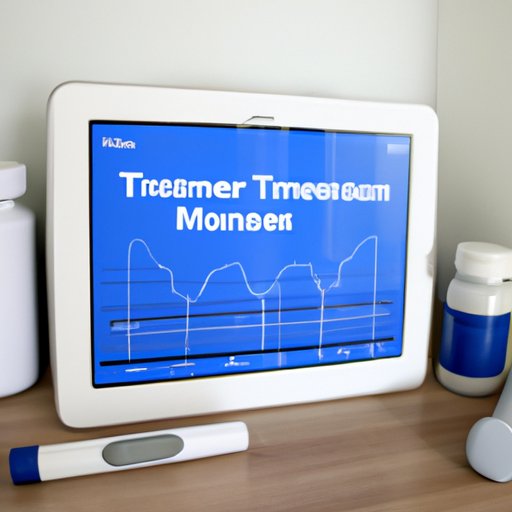Introduction
Testosterone is a sex hormone found in both men and women. It is primarily responsible for male characteristics such as muscle growth, facial hair, and deeper voices. In addition to these physical characteristics, testosterone also plays an important role in maintaining overall health. For men, healthy testosterone levels are essential for a variety of reasons, including improved energy levels, better sleep, and increased libido.
How to Naturally Increase Your Testosterone Levels
There are several natural ways to increase your testosterone levels. Regular exercise, a balanced diet, and stress management are key components of maintaining healthy testosterone levels.
Exercise
Regular exercise can help increase testosterone levels. Weightlifting, in particular, has been shown to significantly boost testosterone production. Additionally, aerobic exercise like running or swimming can help you maintain a healthy weight, which is important for testosterone production.
Diet and Nutrition
Eating a balanced diet rich in whole foods is important for keeping testosterone levels at a healthy level. Foods high in zinc, such as oysters, beef, and spinach, have been linked to higher testosterone levels. Additionally, eating healthy fats, such as avocados and olive oil, can help keep testosterone levels balanced.
Stress Management
Stress can have a negative effect on testosterone levels. Incorporating activities like yoga, meditation, and deep breathing into your daily routine can help reduce stress and improve testosterone production.
What are the Normal Ranges of Testosterone Levels in Men?
It is important to understand what a healthy range of testosterone levels looks like. The normal range of testosterone levels in men can vary depending on age. Generally, men between the ages of 19 and 39 should have a total testosterone level between 300 and 1,000 nanograms per deciliter (ng/dL). After 40, testosterone levels tend to decline, but they should still remain within the normal range.
Certain factors can affect testosterone levels, such as age, lifestyle, and medical conditions. Stress, lack of sleep, and obesity can all contribute to lower than normal testosterone levels. Additionally, certain medications, such as steroids and testosterone replacement therapy, can also affect testosterone levels.

Foods to Eat and Avoid to Keep Testosterone Levels Balanced
Foods to Eat
There are certain foods that can help keep testosterone levels balanced. Eating foods high in zinc, such as oysters, beef, and spinach, can help boost testosterone production. Additionally, eating healthy fats, such as avocados and olive oil, can also help keep testosterone levels balanced.
Foods to Avoid
There are also certain foods that can have a negative effect on testosterone levels. Processed foods, such as junk food and fast food, can lead to an imbalance in testosterone levels. Additionally, drinking excessive amounts of alcohol can also have a negative effect on testosterone levels.

The Effects of Low Testosterone Levels
Low testosterone levels can have a number of negative side effects. Common symptoms of low testosterone levels include fatigue, decreased libido, and erectile dysfunction. Additionally, low testosterone levels can increase the risk of health problems such as heart disease, osteoporosis, and depression.

How to Monitor Your Testosterone Levels at Home
If you are concerned about your testosterone levels, there are a few things you can do to check them at home. At-home tests, such as saliva and urine tests, can provide an indication of your testosterone levels. Additionally, professional tests, such as blood tests, can provide more detailed information about your testosterone levels.
Conclusion
Maintaining a healthy testosterone level is essential for men’s overall health. Regular exercise, a balanced diet, and stress management are key components of increasing testosterone levels naturally. Additionally, understanding the normal range of testosterone levels in men and avoiding certain foods can help keep testosterone levels balanced. Finally, if you are concerned about your testosterone levels, at-home and professional tests can provide an indication of your testosterone levels.
(Note: Is this article not meeting your expectations? Do you have knowledge or insights to share? Unlock new opportunities and expand your reach by joining our authors team. Click Registration to join us and share your expertise with our readers.)
